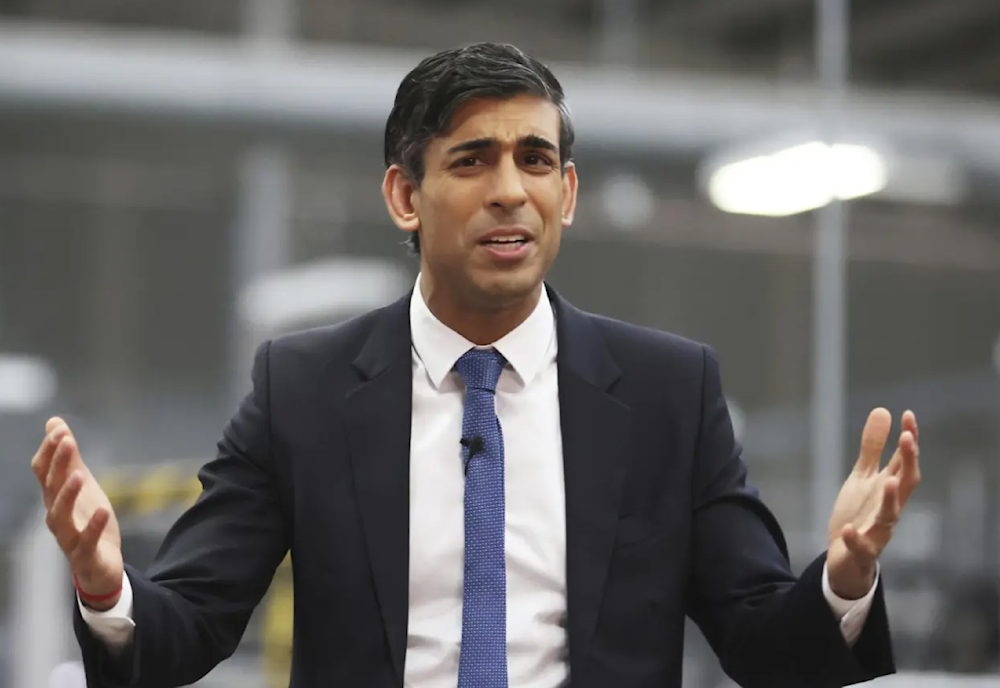Sunak government freed over 10,000 prisoners 70 days early
The Justice Secretary will announce on Friday afternoon that low-risk offenders would be automatically freed after completing 40% of their sentence for the first time.
-

Britain's Prime Minister Rishi Sunak holds a Q&A session with local business leaders during a visit to Coca-Cola HBC in Lisburn, Northern Ireland on February 28, 2023. (AP)
Rishi Sunak's administration has freed more than 10,000 convicts up to 70 days early, according to estimates, as the new Justice Secretary prepares to propose further emergency measures to alleviate another jail overcrowding issue.
Last month, The Guardian reported that prison governors in England and Wales cautioned that by the second week of July, jails will be so overcrowded that they will struggle to accommodate any more inmates, creating an immediate crisis for the incoming UK government.
According to Ministry of Justice records, between October 2023 and June 2024, 10,083 inmates were released under the end-of-custody supervised license (ECSL) system in England and Wales.
Under the proposal, which was announced in October 2023, certain convicts might be released 18 days before their conditional release date. In March, this was extended to 35 days, and in May to 70 days.
Shabana Mahmood, the Justice Secretary and Lord Chancellor, will announce on Friday afternoon that low-risk offenders would be automatically freed after completing 40% of their sentence for the first time.
This year, several thousand convicts are anticipated to be released early, beginning in September, with figures handed out gradually.
The policy is intended to apply to offenders serving terms of less than four years, but not to those convicted of violent, sexual, or terrorism-related acts.
It comes as senior police and prison officials warned that if jails stop accepting convicts, peace and order might collapse within days.
The 'least worst option'
A senior police source stated that criminals would take advantage by doing crimes they would not normally commit, like looting, while former inmates released on parole would be more likely to re-offend since they knew they would be less likely to be recalled.
The Metropolitan Police Commissioner, Mark Rowley, stated that the government's proposed proposals are "the least worst option."
He told ITV's Good Morning Britain that “prisons are very, very close to full and filling up day in day out. The worst possible thing would be for the system to block because the system blocks in prisons if they get completely full. That kicks back into the courts and into what we do. And that’s really dangerous for the public."
The adult male jail population on Monday was 83,755, with a "usable operational capacity" of 84,463, according to government figures. A buffer of 1,425 cells is needed to accommodate unanticipated influxes of convicts.
The majority of inmates serve half of their term in jail, with the other half serving on parole and facing the possibility of being sent to prison if they violate their parole conditions.
A lack of support in parliament stopped Alex Chalk, the former Justice Minister from releasing convicts after serving 40% of their sentence and imprisoning fewer people.
Campaigners against violence against women and girls are nonetheless concerned about whether the new ideas will safeguard women, particularly victims of domestic abuse. It was discovered that several domestic abusers were freed under the ECSL system announced by Chalk.
Farah Naz, an aunt of a victim Zara Aleena, who was murdered by a man on parole for nine days told BBC Breakfast that releasing criminals after completing 40% of their sentences might be "a dangerous gamble with public safety."
"It was a man that was emboldened because he was not supervised, he was not assessed, he was constantly allowed to do what he wanted to do, and therein lies a dangerous gamble with public safety with this move right now.”
In the instance of Aleena's murderer, Jordan McSweeney, Naz stated that the probation service was "not fit to deliver supervision" or "act in a timely way" when he violated his probation.

 4 Min Read
4 Min Read








